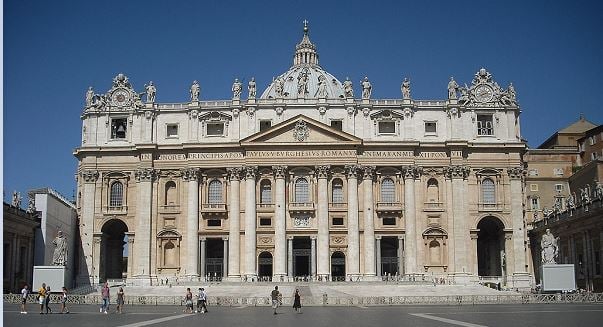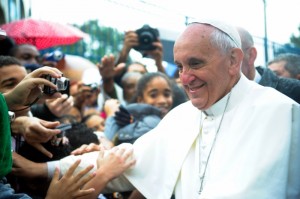I would stress that education, correctly understood, cannot fail to foster respect for creation…. Environmental protection and the connection between fighting poverty and fighting climate change are important areas for the promotion of integral human development.
–Pope Benedict XVI, speaking to diplomats
accredited to the Holy See
on Monday, January 9, 2012
Our Holy Father is in love with Creation. That is evident in his teachings, in his writings, in his smile when he encounters an animal or gazes upon a mountain range.
In July 2007, while vacationing at Lorenzago di Cadore, Pope Benedict told a group of 400 priests, deacons and seminarians that the debate between creationism and evolution is an “absurdity” since evolution can coexist with faith. Speaking to MSNBC, he reminded them that although there is much scientific proof to support evolution, the theory cannot exclude a role by God. And evolution, he noted, cannot answer the great philosophical questions, such as where everything came from.
In August 2008, he returned to the theme once again—telling 400 priests in a closed meeting that “God entrusted man with the responsibility of creation.” The blame for destruction of the environment lies, he said, with materialism. Living in a materialistic world where God is denied has led to environmental abuse. “In a world closed in on its materialism,” he reminded us, “it is easier for the human being to make himself the dictator of all other creatures and of nature.”
In the same talk, he encouraged Catholics to look to St. Francis of Assisi as a man who lived “a way of life that is respectful of the environment.”
In December 2008, Pope Benedict XVI addressed the Roman Curia on the subject of the “Creator Spirit”—the Spirit of God who “creates the world and constantly renews it.” So, he explained, the Creator Spirit is constantly present and active also today.
In his message for the World Day of Peace (January 1, 2010), Pope Benedict, in an address titled “If You Want to Cultivate Peace, Protect Creation,” asked:
“Can we remain indifferent before the problems associated with such realities as climate change, desertification, the deterioration and loss of productivity in vast agricultural areas, the pollution of rivers and aquifers, the loss of biodiversity, the increase of natural catastrophes and the deforestation of equatorial and tropical regions? Can we disregard the growing phenomenon of ‘environmental refugees’, people who are forced by the degradation of their natural habitat to forsake it—and often their possessions as well—in order to face the dangers and uncertainties of forced displacement?”
Environmental concerns were thrust to the fore again this week at his General Audience on Wednesday, January 11, 2012. One of his special “guests” at the Audience was an endangered Cuban crocodile. The scaly creature—a young Crocodylus rhombifer about two feet long—was seized by Italian forestry authorities last year, after being discovered in an Italian private collection. It now resides in Rome’s Bioparco zoo, which is celebrating its centenary this year; but the young crocodile will be returned to Cuba in March when the Pope makes his official visit to the island country. There, authorities hope it will survive to reach its adult length of 11½ feet.
The number of Cuban crocodiles has declined by 80 percent in recent years—endangered by development and poaching. Listed on the United Nations’ list of endangered species, it now survives only in Cuba’s Zapata and Isle of Youth swamps.











